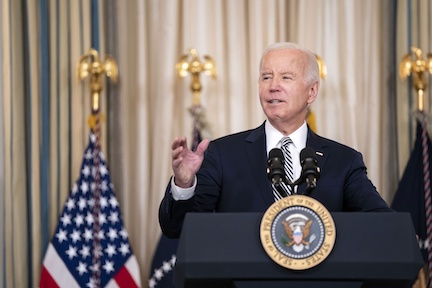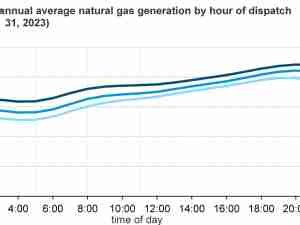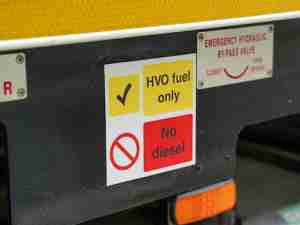The Biden administration on Friday halted the approval of new licenses to export US liquefied natural gas while it scrutinizes how the shipments affect climate change, the economy and national security — a moratorium likely to disrupt plans for billions of dollars in projects.
The Energy Department study will build on an existing analysis that underpins the agency’s review of proposals to send more natural gas to European, Asian and other countries that are not US free-trade partners. New exports are now vetted on a case-by-case basis to see whether they are in the public interest — a threshold established by federal law — but government assumptions used in those reviews haven’t been updated since 2018.
“We will take a hard look at the impacts of LNG exports on energy costs, America’s energy security and our environment,” President Joe Biden said in a statement. “This pause on new LNG approvals sees the climate crisis for what it is: the existential threat of our time.”

The move strikes at the heart of the debate over LNG’s role in the future of energy.
While advocates contend it’s crucial for getting developing nations to stop using coal and enabling Europe to power its economy without Russian gas, environmentalists warn that building the enormous infrastructure required to ship LNG ensures it will be burned for generations to come.
The administration’s pause comes as environmentalists have seized on projects, including Venture Global LNG Inc.’s CP2 export terminal planned for the Gulf Coast, as a litmus test of the president’s climate change commitment.
The review, which won’t affect previously granted authorizations or immediately shake the US status as the world’s top LNG exporter, will be conducted by the Energy Department’s national labs. It could stretch for months before a report is made available for public comment. Senior administration officials who briefed reporters on the plan would not put a firm timeline on the process, saying only that it would be done expeditiously and take some months.
“A lot has happened in the past decade since this program was created and we need to have an even greater understanding of the market need, the long-term supply and demand of energy resources, and the environmental factors,” Energy Secretary Jennifer Granholm said.
The pause could have implications for more than a dozen proposals now awaiting review at the Energy Department, including ventures planned in Louisiana by Commonwealth LNG and Energy Transfer LP.
The issue is politically fraught for Biden — forcing him to balance an array of competing priorities. A months-long review would effectively foreclose decisions on additional LNG exports until after the Nov. 5 presidential election.
Environmentalists, such as Bill McKibben, who successfully led the campaign to block the Keystone XL oil pipeline roughly a decade ago, have pressed Biden to shift course on LNG and made clear they are scrutinizing every fossil-fuel project approval under his watch.
The halt in permits represents “the first step in stopping these mega-climate bombs,” said Allie Rosenbluth, US program manager for the environmental group Oil Change International. “Stopping LNG exports is a make-or-break issue for his climate record this election.”
At the same time, Republicans — including former President Donald Trump — have accused Biden of making a priority of his climate agenda at the expense of domestic jobs and other economic concerns.
On Wednesday, Senate Republican leader Mitch McConnell asserted that limiting LNG exports would hinder the US goal of combating Russia’s influence as a global gas supplier.
White House National Climate Advisor Ali Zaidi said the government’s existing analysis was outdated and didn’t reflect evolving information about how much methane — the prime ingredient in natural gas — could warm the atmosphere. Earlier studies were completed in 2012, 2015 and 2018.
Natural gas burns more cleanly than coal — and oil industry allies argue that’s one reason to bolster exports, not halt them. But environmentalists say methane leaks from wells, pipelines and processing undermine those green credentials and that expanded LNG exports can crowd out investments in emission-free alternatives.
LNG advocates excoriated the administration’s decision, saying it would chill development and undercuts US promises to help Europe displace Russian gas after the invasion of Ukraine.
“The administration’s decision to freeze review of new LNG terminals is deeply disturbing and raises significant risks around the globe,” said Marty Durbin, president of the US Chamber of Commerce’s Global Energy Institute. “It betrays our allies at a time of geopolitical instability and could slow the energy transition.”
Already, 10 North American projects have won the Energy Department’s blessing to export US LNG, but they remain in various stages of development. The US has seven other LNG projects currently operating, and an additional 12 billion cubic feet a day of export capacity still could be constructed just under existing approvals.
Four projects will be hardest hit because they have gone through initial permitting and undergone a separate required review by the Federal Energy Regulatory Commission yet are effectively blocked without a final export license from the Energy Department.









